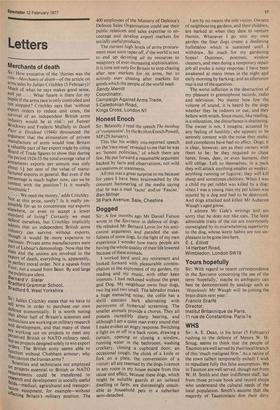Merchants Merchants of death Sir: How evocative of the 'thirties
was the title—Merchants of death--of the article on arms sales by Julian Critchley (5 February)! Much of what he says makes good sense, and yet . . . What future is there for my Pupils if the arms race is only controlled and not Stopped? Critchley says that 'without export orders to reduce unit costs, the survival of an independent British arms industry would be at risk'; yet Fenner Brockway and Frederic Mullally in Death PaYs Dividend (1944) denounced the argument that the elimination of private manufacture of arms would lose Britain a valuable part of her export trade by citing Board of Trade figures to show that during the Period 1924-33 the total average value of armaments exports per annum was only about 1 per cent of the value of manufactured exports in general. But even if the Percentage is much higher now, can we be Content with the position ? Is it morally acceptable?
• We need the money,' adds Critchley. Not at this price, surely? Is it really imPossible for us to concentrate our exports elsewhere, or even to accept a lower standard of living? Certainly we must defend ourselves, but Critchley implicitly ,clnlits that an independent British arms ,111,..dustrY can survive without exports, u'citigh it would be more expensive to maintain, Private arms manufacturers were Part of Labour's demonology. Now that the state and the unions are involved in the !xPort of death, everything is, apparently, 'En Perfect moral order. Not a squeak from
°ix; not a sound from Benn. By and large the Pulpits are silent.
erriard V. Slater
Bradford Grammar School, Bradford 9, West Yorkshire Sir: Julian Critchley states that we have to seIi arms in order to purchase our own defence economically. It is worth noting that about half of Britain's scientists and technicians are working on military research and development, and that many of these are working not on projects to meet any [/lereeived British or NATO military need, lit on projects designed solely to win export orders. The British army seems able to f.Unction without Chobham armour; why °len cannot the Iranian army ? Scientists and technicians not employed " Projects essential to British or NATO requirements could be transferred to rfiesearch and development in socially useful el,ds—medical, agricultural and transpor`ation equipment, for example—without aftecting Britain's military position. The
400 employees of the Ministry of Defence's Defence Sales Organisation could use their public relations and sales expertise to encourage and develop export markets for socially useful products.
The current high levels of arms procurement must soon taper off, if the world is not to end up devoting all its resources to weaponry of ever-increasing sophistication. It is time not only for Britain to stop chasing after new markets for its arms, but to actively start chasing after markets for goods which the people of the world need. Sandy Merritt Coordinator, Campaign Against Arms Trade, 5 Caledonian Road, Kings Cross, London Ni


































 Previous page
Previous page